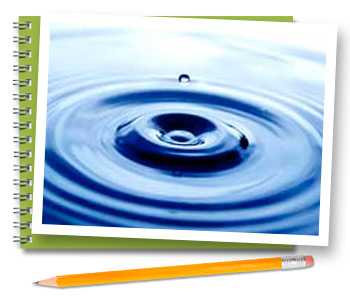Why Is Water Conservation Important?
 Since 70 percent of the Earth is covered by water, this resource seems deceptively abundant. However, 97.5 percent of all water on Earth is salt water, leaving only 2.5 percent as fresh water. Of that fraction, 70 percent is frozen in icecaps and much of the rest is trapped as soil moisture or deep below the Earth. This leaves less than one percent of the world’s potable, or drinkable, water left for consumption. In addition, we must share that small amount among people, animals, and plants.
Since 70 percent of the Earth is covered by water, this resource seems deceptively abundant. However, 97.5 percent of all water on Earth is salt water, leaving only 2.5 percent as fresh water. Of that fraction, 70 percent is frozen in icecaps and much of the rest is trapped as soil moisture or deep below the Earth. This leaves less than one percent of the world’s potable, or drinkable, water left for consumption. In addition, we must share that small amount among people, animals, and plants.
About Water Conservation
The US has an annual 3,700 billion gallon water deficit. We use water to drink, grow plants, and to clean dishes, clothes, cars, and ourselves. We use so much, so often, that it may seem as though it will always be there. It will not. Everyday, we dig deeper, pump faster, and ship farther to get water into our homes. The quality of water itself is diminishing as our population and demand increases.
Luckily, technologies are slowly being developed to treat water effectively and efficiently. Desalinization, although extremely costly, removes salt from water, making it drinkable. However, all the technology in the world will not change the fact that water is a limited resource that is shared by every living being on the planet. There is no substitute for conservation.

Schools In This Category »
Partnerships (e.g. Broward County Water Resource Services, South Florida Water Management District)
Saving Water in the Bathroom
Approximately 75 percent of the water we use in our homes is used in the bathroom. For example, unless you have a low flow toilet that saves water, you use anywhere from three to seven gallons of water with every flush! In addition to this, a leaky toilet can waste more than 10,000 gallons of water a year!
Drippy faucets are water-wasters, too. A faucet that leaks enough water to fill a soda bottle every 30 minutes will waste 2,192 gallons of water a year.
Water saving bathroom fixtures such as low flow sinks, toilets, urinals, and showerheads are available wherever you normally buy these items. There are even fixtures that use no water, such as waterless urinals and composting toilets. Composting toilets serve a second function because they also produce nutrient rich soil. Some green buildings have their own onsite wastewater facility, which produces reclaimed water (treated water that is not suitable for drinking but is useful for other purposes) that can be used to water plants and flush toilets.
Saving Water in the Cafeteria
Water saving fixtures and aerators for kitchen sinks can be easily installed in cafeterias. Water conserving icemakers are gaining popularity in hospitality-oriented businesses and in schools. Look for water saving opportunities when washing dishes and food items. Putting up water conservation signs and tips in high traffic areas can go a long way to encourage water savings.
Saving Water Outdoors
Irrigation accounts for a large majority of your water bill. Washing your car can use up lots of water, too. As described on the Gardens & Landscaping page, there are many actions you can take to conserve water. Overwatering produces weak plants and roots. Think of alternative sources to potable drinking water for outdoor activities. If possible, rain and reclaimed water should be used for washing your car and watering your plants.